VIVIX® Antioxidant Solution
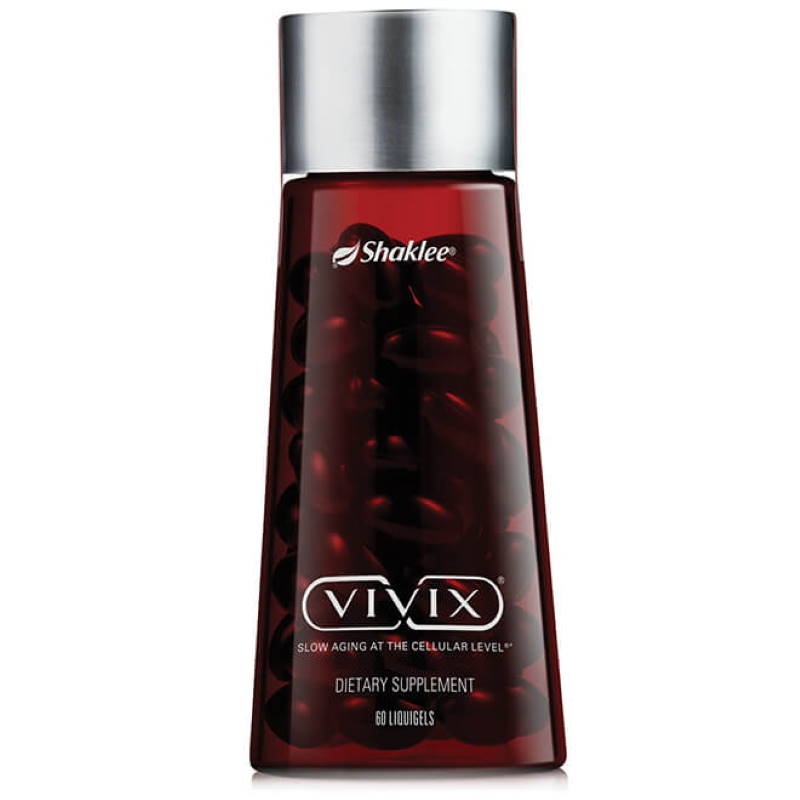
Definition of antioxidant
So what exactly is an antioxidant? The Institute of Medicine defines a dietary antioxidant as "a substance in foods that significantly decreases the adverse effects of reactive species, such as reactive oxygen and nitrogen species, on normal physiological function in humans."
The term “reactive species” is a scientific way of referring to free radicals – short-lived, highly reactive molecular fragments that can cause destructive chain reactions within the cells of your body. These reactions can have a direct impact on the lifespan of cells and the health of the DNA in each cell. Antioxidants are able to stop these reactions by destroying the free radicals.
Antioxidant ingredients in Vivix
The most commonly known antioxidant nutrients include vitamins C and E; minerals such as selenium, copper, manganese, and zinc; coenzyme Q10; and the carotenoids. However, there are a multitude of other nutrients that possess antioxidant properties, including a large group of organic molecules found in plants called polyphenols. Shaklee scientists have chosen a number of these plant polyphenol sources to include in Vivix to make it a unique antioxidant product.
Japanese knotweed (Polygonum cuspidatum)
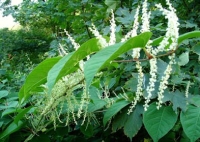 The first ingredient selected for inclusion in Vivix is a compound called resveratrol. This component of red wine is credited with helping lower the incidence of cardiovascular disease in France for people who eat a high-fat diet and also drink a lot of red wine. This is what’s known as the French Paradox.
The first ingredient selected for inclusion in Vivix is a compound called resveratrol. This component of red wine is credited with helping lower the incidence of cardiovascular disease in France for people who eat a high-fat diet and also drink a lot of red wine. This is what’s known as the French Paradox.
Resveratrol is typically found in grapes used to make red wine, but not all grapes contain the same percentage of resveratrol. To avoid variability in potency, Shaklee uses a different natural resveratrol source that’s at least 98% pure: it’s from a plant called Japanese knotweed (pictured left), which has the Latin name Polygonum cuspidatum.
Resveratrol from Japanese knotweed is extremely well tolerated and its potency is unsurpassed. The daily dose of one teaspoon (5 mL) of Vivix delivers 100 mg of resveratrol, which is the same amount you would find in 100 glasses of red wine.
Muscadine grape (Vitis rotundifolia)
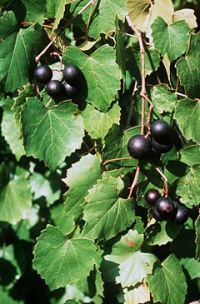 A second powerful ingredient in Vivix comes from a remarkable “super” grape, known as muscadine or Vitis rotundifolia. Muscadine grapes are much larger than regular grapes and are the only grapes found in nature with an extra chromosome – which, scientists believe, gives them the ability to produce more beneficial polyphenol antioxidants than other grape varieties. These polyphenols protect the grape as it grows in hot, humid environments, so you’ll mostly find it commercially grown in the sultry American southeast, in such states as Georgia, Florida, and the Carolinas.
A second powerful ingredient in Vivix comes from a remarkable “super” grape, known as muscadine or Vitis rotundifolia. Muscadine grapes are much larger than regular grapes and are the only grapes found in nature with an extra chromosome – which, scientists believe, gives them the ability to produce more beneficial polyphenol antioxidants than other grape varieties. These polyphenols protect the grape as it grows in hot, humid environments, so you’ll mostly find it commercially grown in the sultry American southeast, in such states as Georgia, Florida, and the Carolinas.
Muscadine grapes (shown left) contain many special compounds known to provide health benefits. They’re concentrated in the skin and seed of the grape. Our extract deals with the whole grape, not like other extracts that use only the pulp or pomace of the grapes and then have added sugar and water. Our extract is particularly rich in ellagic acid, a phytonutrient not found in ordinary grapes.
Developing the super grape extract was quite an adventure for the Shaklee scientists! They needed a way to maximize the potency of the polyphenol compounds found in these super grapes, so they worked with scientists from the University of Georgia to create a gentle extraction process that would guarantee the highest possible biological activity. The process combines two different varieties of muscadine grapes and concentrates them – but not to dryness – so as not to destroy the potency of any of the polyphenols.
European elderberry (Sambucus nigra)
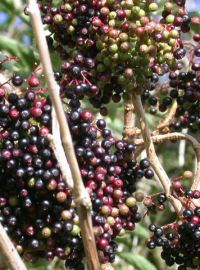 The next ingredients added to Vivix are the juice and two different extracts of European elderberry (Sambucus nigra) fruit. Elderberries have received increased attention in recent years due to their high contents of anthocyanins.
The next ingredients added to Vivix are the juice and two different extracts of European elderberry (Sambucus nigra) fruit. Elderberries have received increased attention in recent years due to their high contents of anthocyanins.
Anthocyanins, as well as other flavonoids in elderberries, exhibit antioxidant properties, and it’s believed that their consumption may contribute to the prevention of several degenerative diseases. Extracts from elderberry fruit have been used in numerous clinical studies.
(European elderberries are pictured on the left.)
Purple carrot (Daucus carota sativa)
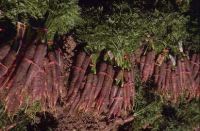 A final plant ingredient that supplies antioxidants to Vivix is the purple carrot (Daucus carota sativa). These vegetables (pictured right) are purple on the outside but orange on the inside, and get their pigment not from beta-carotene like regular orange carrots but from the same class of compounds found in European elderberries: the anthocyanins, which are powerful antioxidants. Purple carrots also contain alpha- and beta-carotene, two carotenoids that have well-known antioxidant properties.
A final plant ingredient that supplies antioxidants to Vivix is the purple carrot (Daucus carota sativa). These vegetables (pictured right) are purple on the outside but orange on the inside, and get their pigment not from beta-carotene like regular orange carrots but from the same class of compounds found in European elderberries: the anthocyanins, which are powerful antioxidants. Purple carrots also contain alpha- and beta-carotene, two carotenoids that have well-known antioxidant properties.
Antioxidant ingredients in Kosher Vivix®
Kosher Vivix doesn’t contain the muscadine grape extract as a source of polyphenols because our unique muscadine extract is a non-kosher ingredient. In accordance with kosher law, a rabbi would need to be present throughout all the various stages of production of the proprietary Shaklee extract, from the gathering of the grapes at the ideal harvesting time to all the various stages of extract production, which are done at different facilities in different states.
Scheduling this kosher oversight, along with the complexity of the specific production processes involved, precludes offering a kosher product that includes the muscadine grape. In place of the muscadine grape extract, pomegranate extract and juice are used instead to supply polyphenols in Kosher Vivix.
Pomegranate (Punica granatum)
 Native to the Middle East, the pomegranate (pictured right) has been introduced to other countries around the world and is grown commercially in the southwest United States. The most abundant polyphenols in pomegranate juice and extracts are ellagitannins formed when ellagic acid (also found in muscadine grapes) binds with carbohydrates. These compounds have excellent free radical–scavenging properties.
Native to the Middle East, the pomegranate (pictured right) has been introduced to other countries around the world and is grown commercially in the southwest United States. The most abundant polyphenols in pomegranate juice and extracts are ellagitannins formed when ellagic acid (also found in muscadine grapes) binds with carbohydrates. These compounds have excellent free radical–scavenging properties.
Other Vivix ingredients
Vivix and Kosher Vivix are both combinations of the active natural ingredients described above and a number of inactive ingredients that keep all of the active ingredients in a stable, bioavailable dosage form (a pleasant-tasting tonic).
Sorbitol is a natural alcohol sugar in liquid form that, along with glycerin and water, acts as a diluent to keep all the ingredients dissolved. It’s found naturally in pears, apples, cherries, plums, peaches, and apricots; however, it's produced commercially from corn. Sorbitol is slowly and incompletely absorbed by the blood, so it has a low glycemic index and a minimal impact on blood sugars.
Silicon dioxide keeps these various ingredients in a stable suspension. Natural flavours give the product a distinctive, reproducible flavour (because the active ingredients will have variable flavours from batch to batch).
Shaklee exclusivity
Shaklee has applied for a patent on the involved process used to make the muscadine extract used in Vivix so that it can’t be duplicated by any another company. We’ve also made a sizable investment in the equipment used for the extraction process, which guarantees us exclusivity for years to come with the contract manufacturers who perform the various production operations. In addition, Shaklee has long-term contracts with major growers of muscadine grapes in the southeast United States to ensure an ongoing supply of this vital raw material.
Summary
Vivix has taken many years of research and ingenuity to develop and has been an extremely complex project – but the result has been worth it. This unique combination of antioxidants protects cells from the ravages of free radicals and the damage they can do to DNA, thus directly helping prolong cellular life and maintain good health.
Learn More
Resveratrol Facts Explained - Resveratrol is frequently referred to as “The active ingredient in Red Wine” but that is a serious over-simplification and the evidence is clear – there is not enough resveratrol in a glass of wine to make a difference.
Resveratrol Boosts Brain Blood Flow - Resveratrol, an antioxidant found in grape skins, berries, cocoa and peanuts, has been called the modern-day “fountain of youth” for a very compelling reason: it appears to slow down aging and even increase the lifespan of human cells.
Resveratrol, Wine and Chocolate - Another crappy study that should not have been published and has been embellished by the media.
Where can I buy Vivix?
Canada: Vivix Antioxidant Solution
US: US Vivix Antioxidant Solution